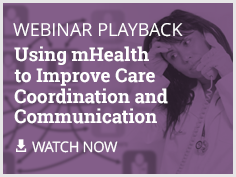For as long as I can remember, I have lived in the world of healthcare. Many members of my family, and even more of my friends, work in the field of medicine. In my “previous life,” I worked in pharmaceuticals and life sciences, in and out of hospitals and clinics.
Being around my family, friends, and colleagues, it was compelling to me that so many of them were always checking the pager in their pocket or on their belt. The familiar beep-beep-beep was a common sound of my upbringing and professional life. I remember my dad, a surgeon, stopping the car to find a phone so he could return a page. I remember my mom, a nephrologist, turning the car around to retrieve her beeper she left at home before running errands. I remember my wife, a nurse, telling me that it was common to have to page three or four different people with a question about a single patient, and then roam the halls looking for her care team members because no one returned her pages.
I remember asking everyone, “Why does your pager keep beeping at you?” The answer was always the same: because something needs to be discussed in order for a decision to be made about the care of a patient.
It dawned on me at a very early age that, at the most basic level, medicine is about people working with other people to care for people. Healthcare is a human endeavor. And humans are social beings that rely on one another. And holding this reliance together is the ability to communicate with one another to work together for a common purpose.
If communication is so essential to the art and science of medicine, why are the communication technologies within medicine so limited? We live in the age of mobile smartphone technology. It is ubiquitous in our culture and day-to-day life. In healthcare, nearly ¾ of physicians use smartphones when treating patients and 62 percent are using iPads and other tablets on a regular basis. It ceases to amaze me that physicians and hospital providers still rely on technology that had its heyday over 20 years ago.
At one point, I thought pagers were the stalwart communication tool in medicine because of the insecurity of text messaging on smartphones. But then I realized that pagers openly broadcast their messages across the airwaves, un-encrypted, possibly putting personal health information at risk of breach.
Today, medicine offers some of the most amazing technologies the world has ever seen, such as the gamma knife or the MRI. These machines and the technology that makes them go are astounding. For most of us, even if we understand that technology makes these machines work, what they provide us lies in the realm of magic.
And so does mobile smartphone technology. Think of all the ways we use our mobile devices in our daily lives. To connect with one another and communicate things that keep us informed and up-to-date with what is happening.
We can have the same thing within healthcare, starting in hospitals and then moving beyond the walls to every other area of healthcare. Communication between and among healthcare providers that connects people in real-time, so decisions can be made about people’s treatment.
The time has come to empower today’s healthcare provider with communication – and collaboration – tools that leverage the mobile technology that is in everyone’s pocket. I started Care Thread to be a part of the effort to make healthcare communication and care team collaboration smarter, faster, and better.
These are the reasons I started Care Thread.
Together, we can improve healthcare – a most humane endeavor.
Nick Adams, Co-Founder & President





